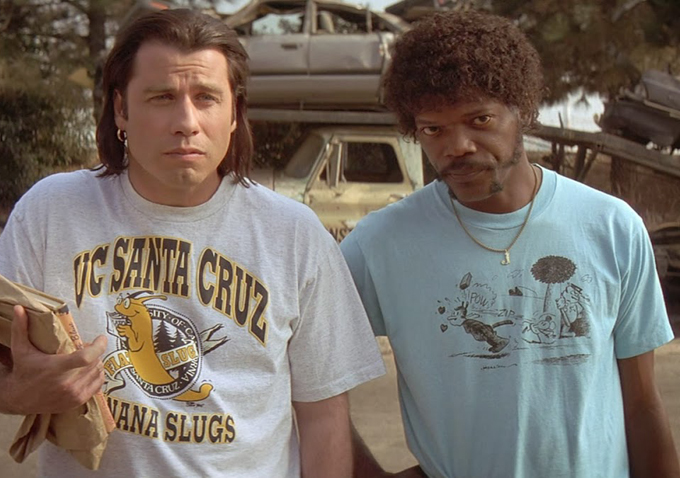By providing your information, you agree to our Terms of Use and our Privacy Policy. We use vendors that may also process your information to help provide our services. This site is protected by reCAPTCHA Enterprise and the Google Privacy Policy and Terms of Service apply.
7 Revelations That Came Out of Harvey Weinstein’s Tribeca Talk

READ MORE: The 6 Best Things Harvey Weinstein Said at Sundance 2015
He may not write, direct or act, but Harvey Weinstein is one of Hollywood’s most powerful and notorious figures.
His name is probably the most heavily-mentioned of any during Oscar season, as his reputation for pushing small movies (like “The King’s Speech” or “The Artist“) to big wins remains unmatched among today’s major distributors. And though his intense commitment to his films has rendered him a somewhat imposing and controversial figure, he’s given filmmakers such as Quentin Tarantino a group to reliably trust their films in.
His influence is as undeniable as his tendency to speak his mind. So it should come as no surprise that Weinstein shared several juicy details on a wide range of topics during a special Tribeca Talks panel over the weekend at the Tribeca Film Festival. From comments about Tarantino’s undying loyalty to last year’s controversy surrounding “Selma,” read on below for seven of the most fascinating tidbits to come out of “Tribeca Talks: Harvey Weinstein in Conversation.”
He credits Quentin Tarantino for building his brand (and he’s very excited for “The Hateful Eight”).
 Quentin Tarantino has stuck with the Weinstein Company since his debut feature ‘Resevoir Dogs,” which for an auteur of such prominence and experience is a rare showing of loyalty. When asked how that committed relationship came about, Weinstein recalled, “I think it probably came on ‘Pulp Fiction.’ When we saw the movie and got into Cannes, I had an idea which was just ‘let’s not show this to anybody’ … I just wanted it to be one of these special nights, and let the audience either be blown out or yell and boo us out. It turned out to be a pretty good decision because here’s this French audience in black tie, and they’re dancing. They’re dancing to this movie. The only other time I saw that was with Sergio Leone’s ‘One Upon a Time in America.'” It was such a success, Weinstein continued, that jury president Clint Eastwood wanted to give Best Actor to John Travolta — but he was persuaded to look elsewhere.
Quentin Tarantino has stuck with the Weinstein Company since his debut feature ‘Resevoir Dogs,” which for an auteur of such prominence and experience is a rare showing of loyalty. When asked how that committed relationship came about, Weinstein recalled, “I think it probably came on ‘Pulp Fiction.’ When we saw the movie and got into Cannes, I had an idea which was just ‘let’s not show this to anybody’ … I just wanted it to be one of these special nights, and let the audience either be blown out or yell and boo us out. It turned out to be a pretty good decision because here’s this French audience in black tie, and they’re dancing. They’re dancing to this movie. The only other time I saw that was with Sergio Leone’s ‘One Upon a Time in America.'” It was such a success, Weinstein continued, that jury president Clint Eastwood wanted to give Best Actor to John Travolta — but he was persuaded to look elsewhere.
Weinstein expressed deep gratitude for Tarantino’s loyalty, explaining that “I always say the house that Ruth built was Yankee Stadium, and the house that Quentin built was Miramax and the Weinstein Company.” He also gushed of the upcoming “The Hateful Eight:” “Quentin is shooting in 70mm, and he’s making no compromises … I promise you, having seen about 40 minutes of it right now, it’s special. It’s fun and sharp and edgy.”
He was able to scoop up “Good Will Hunting” because he actually read the script.
 “Good Will Hunting” had been bouncing around studios with different companies having different intentions (including, for some, having Brad Pitt star). So how did Weinstein end up with the hot project from Matt Damon and Ben Affleck?
“Good Will Hunting” had been bouncing around studios with different companies having different intentions (including, for some, having Brad Pitt star). So how did Weinstein end up with the hot project from Matt Damon and Ben Affleck?
“I read the script and had the first meeting with Ben and Matt, and [executives] were there telling them how much I love the script. And I said, ‘Guys, on page 60 there’s a scene where the two professors perform oral sex on each other. I don’t understand that.’ I thought they were both heterosexual in the way they talked before — he lost his wife and he talks about his family. I’m like, ‘What the hell was that?’ And they said, ‘That’s the red herring! Now we know you’re the first guy in a studio to have read the script.’ … They gave it to me on the spot. They said, ‘We’re making it with you because you read it yourself.'”
“The Artist” went from obscure silent film to Best Picture winner because he trusted his gut.
 A close friend of Weinstein’s was endlessly raving about “The Artist,” at the time a low-profile silent film from French comic director Michel Hazanavicius. But when he screened it, Weinstein fell in love instantly: “I bought whatever was left, on the spot. It was a lot of money, based on what it was. I called my brother and David Glasser and said, ‘Hey, I just bought this movie’ … and I said, ‘It’s silent.’ And David said, ‘You’re going to have to go to the board and explain. You’re obviously high from ‘The King’s Speech.” I didn’t even know we had a board!
A close friend of Weinstein’s was endlessly raving about “The Artist,” at the time a low-profile silent film from French comic director Michel Hazanavicius. But when he screened it, Weinstein fell in love instantly: “I bought whatever was left, on the spot. It was a lot of money, based on what it was. I called my brother and David Glasser and said, ‘Hey, I just bought this movie’ … and I said, ‘It’s silent.’ And David said, ‘You’re going to have to go to the board and explain. You’re obviously high from ‘The King’s Speech.” I didn’t even know we had a board!
“The guys went nuts on me because it was a considerable amount of money. I don’t know, I watched that movie and I felt everything that happened to it eventually — the success and everything else — in the room … And I learned things about silent movies that I didn’t even know, from Michel Hazanavicius, the director.”
He doesn’t care what you think about “The Imitation Game.”
 When asked about blending art with activism in regards to “The Imitation Game,” Weinstein’s Best Picture nominee from last year, he responded, “I always get accused of playing ‘the gay card’ with ‘The Imitation Game’ … but it’s important that other voices are heard and other points-of-view are given.” As for the article published in the New York Review of Books which called out “The Imitation Game” as inaccurate, Weinstein claimed that their findings were incorrect. He lamented, “When you’re the New York Review of Books: I know things are tough in the journalism world, but get a couple of researchers!”
When asked about blending art with activism in regards to “The Imitation Game,” Weinstein’s Best Picture nominee from last year, he responded, “I always get accused of playing ‘the gay card’ with ‘The Imitation Game’ … but it’s important that other voices are heard and other points-of-view are given.” As for the article published in the New York Review of Books which called out “The Imitation Game” as inaccurate, Weinstein claimed that their findings were incorrect. He lamented, “When you’re the New York Review of Books: I know things are tough in the journalism world, but get a couple of researchers!”
He also explained that he’s done enough beyond promote the film to prove this wasn’t a chance to merely play the “gay card.” He fully credits the efforts of actors Benedict Cumberbatch and Stephen Fry with the soon-to-be-passed pardon in Britain, which would de-criminalize 49,000 gay people in Britain who faced similar injustices as Alan Turing. As Weinstein emotionally explained, “I can walk out and say that we were a part of the achievement where 49,000 people got pardoned.”
His experiences with the play “All the Way” render the “Selma” controversies all the more puzzling.
 “The ‘Selma’ thing was crazy. We did ‘All the Way’ with Bryan Cranston, which was three hours of [President] Johnson getting the Civil Rights voting bill done. He’s twisting everyone’s arm — this guy was not Plato or Socrates. He was a tough senator from Texas who knew how to get a bill passed. So the idea that his people were criticizing ‘Selma’ — why didn’t they criticize us? We were worse in terms of that!
“The ‘Selma’ thing was crazy. We did ‘All the Way’ with Bryan Cranston, which was three hours of [President] Johnson getting the Civil Rights voting bill done. He’s twisting everyone’s arm — this guy was not Plato or Socrates. He was a tough senator from Texas who knew how to get a bill passed. So the idea that his people were criticizing ‘Selma’ — why didn’t they criticize us? We were worse in terms of that!
“Bryan said ‘We got away with this. It’s unfair that those guys [didn’t]’ … How did we get away with it? We won Best Play last year and Bryan won Best Actor. Nobody came after us, so why did they go after ‘Selma’? It makes you think.”
He claims credit for leveling the Best Picture playing field.
 According to Weinstein, the race for Best Picture was far more pre-determined from the 1950s and ’60s. As he explained, “Each studio would pick their movie and say ‘Okay, we’re releasing this at Christmas’ … the studio would come in and say, ‘Okay, we’ve got 800 votes and Paramount has 900.’ That’s how movies used to get nominated. There would be the rare exception with a great, quality film.”
According to Weinstein, the race for Best Picture was far more pre-determined from the 1950s and ’60s. As he explained, “Each studio would pick their movie and say ‘Okay, we’re releasing this at Christmas’ … the studio would come in and say, ‘Okay, we’ve got 800 votes and Paramount has 900.’ That’s how movies used to get nominated. There would be the rare exception with a great, quality film.”
Without screeners or a known alternate way to do things, the status quo remained just that: until “My Left Foot,” the Jim Sheridan indie from 1989 which went on to win Best Actor for Daniel Day-Lewis and earn a Best Picture nomination. According to Weinstein, it came down to sending out the movie via cassette tape. “It used to be, ‘We didn’t watch the movie’ and you’d have to see the movie in a theater … We changed that with ‘My Left Foot.'”
Yes, even Harvey Weinstein makes mistakes.
 Last year, Weinstein was the subject of some negative press after “Grace of Monaco” premiered to horrific reviews and critical darling “The Immigrant” was released in theaters to very little fanfare. While he didn’t shed any light on those two experiences, Weinstein did express some regret in regards to another film he felt didn’t get the proper treatment. “Gabriel Byrne pitched [it] to me at a restaurant. It was called ‘Into the West,’ and probably not too many people saw it. It was with Ellen Barkin.
Last year, Weinstein was the subject of some negative press after “Grace of Monaco” premiered to horrific reviews and critical darling “The Immigrant” was released in theaters to very little fanfare. While he didn’t shed any light on those two experiences, Weinstein did express some regret in regards to another film he felt didn’t get the proper treatment. “Gabriel Byrne pitched [it] to me at a restaurant. It was called ‘Into the West,’ and probably not too many people saw it. It was with Ellen Barkin.
“It’s a beautiful movie … and I loved the movie, but nobody [went]. Maybe I sold it like a family movie — I don’t know what I did wrong. So I just couldn’t help myself. I took an ad out in the New York Times and said ‘This movie is great. It’s not playing anywhere, and the reason it’s not doing well is because we as distributors did a bad job. And Peter Bart [of Miramax] calls me and goes, ‘What are you doing? You’re an idiot!'” I’ve done bad jobs, and I took a page in the New York Times to admit it.”
READ MORE: Want to Work with Harvey Weinstein One Day? Remember These Tips
By providing your information, you agree to our Terms of Use and our Privacy Policy. We use vendors that may also process your information to help provide our services. This site is protected by reCAPTCHA Enterprise and the Google Privacy Policy and Terms of Service apply.


















